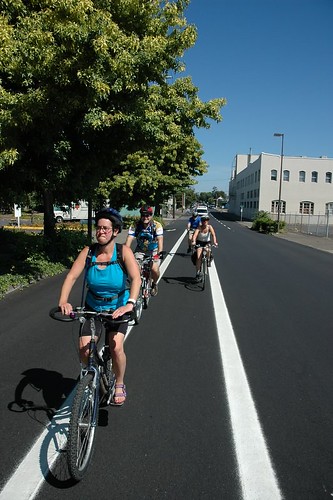On August 13th, the City Council of Roseburg (about 170 miles south of Portland) will attempt to take a rare step toward strengthening the Oregon law mandating use of a bike lane (a.k.a. the mandatory sidepath law). That law, ORS 814.420, mandates that if a bike lane is present it must be used.
While the law is rarely enforced, its vague language lends itself to confusion and controversy. While it mandates use of a bike lane, it also includes many exceptions to the rule. Oregonians are allowed to leave the bike lane to pass another rider, to prepare for a left turn, to avoid debris, and so on. But, legally speaking, the most problematic language in the statute is this:
A person is not required to comply with this section unless the state or local authority with jurisdiction over the roadway finds, after public hearing, that the bicycle lane or bicycle path is suitable for safe bicycle use at reasonable rates of speed.
In a nutshell, if you got a citation for not using the bike lane, you could simply demand proof that a public hearing had been held. If such proof couldn’t be provided, it seems as though the judge have to dismiss the ticket. Police officers in Roseburg want to make sure no more people on bikes can roll through that loophole.
According to the City of Roseburg public works department staffer Nikki Messenger, they plan to hold that public hearing. Messenger told me yesterday that the impetus for this action comes directly from Roseburg traffic cops. “One of our traffic officers contacted me,” she said, “because he had seen violations and would like to enforce the ordinance… We’re just following the statutes.”
“In my view, you really shouldn’t be forced to use the bike lane.”
— Ray Thomas, lawyer and bike law expert
The Roseburg ordinance includes 26 streets that have bike lanes. If passed, no one in Roseburg could ever have a citation for violation of 814.420 dismissed on the grounds that a public hearing hadn’t been held (unless new streets, not on this list, got bike lanes). “The Police Department would have the ability to enforce the statute immediately upon a finding by the Council,” the ordinance reads.
Even though no formal study or inventory of these streets has been done to ensure they are indeed “safe” to ride on, Messenger says city staff supports the ordinance and feels the City Council action is a “reasonable” public process.
This step toward affirming and strengthening 814.420 is noteworthy on many levels.
While the League of American Bicyclists cited the existence of this law as a major negative in our bike-friendly state ranking and many advocates and people who ride want to see it repealed, Roseburg is going in the opposite direction.
Bike law expert Ray Thomas, who has helped create and change bike legislation in his volunteer role with the Bicycle Transportation Alliance (BTA), believes the law shouldn’t exist at all. “In my view, you really shouldn’t be forced to use the bike lane,” says Thomas. Thomas said there’s a movement afoot in Oregon to either repeal or significantly amend the law and he’s looking for people to contact him if they’d like to work on it.
Thomas says that he felt the public hearing loophole was sufficiently closed with the landmark State vs. Potter case that was heard in the Court of Appeals in 2002. In that case, a Critical Mass participant in Portland contended his ticket for not riding in the bike lane should be thrown out because the State couldn’t prove they had held a public hearing as required by statute. In the end, the court ruled against the defendant, stating that they don’t have to prove whether or not a hearing was held. Instead, the State successfully argued that they had met their “burden of production” that the bike lane is legitimate, and therefore must be used, because it is an official traffic control device (citing ORS 810.250, section 3).
In 2006 we learned of another way this “public hearing” loophole has been closed. City of Portland bike coordinator Roger Geller testified at a traffic court trial that the 1996 Bike Master Plan went through a public process and therefore could act as a blanket public hearing for all bike lanes contained within it.
For their part, the BTA says they’re also opposed to 814.420; but they don’t plan to add the issue to their legislative priorities during the 2013 session. BTA Advocacy Director Gerik Kransky told me this morning that he feels 814.420 is “bad public policy” and that, while it’s not on their legislative agenda right now, they’re “interested in having that conversation.” “I would love to see a bill proposed that repeals the whole thing,” he said, “And if it started to gain traction, we would consider working on it.” Kransky added that the BTA’s top priorities in Salem this coming session will be centered around funding, enforcement, and speed. He hopes grassroots advocates in Roseburg will step up and make their voices heard.
Thomas said the Roseburg situation probably won’t have a major impact on the law; but he’s still uncomfortable with how they’re going about it. “I told an activist in Roseburg, if the bike lanes are in bad shape, you guys should show up to City Council and say they’re unsafe.”
— The City Council meeting is set for 7:00 pm on Monday, August 13th. View the 26 streets in question and download a PDF of the official City Council documents pertaining to this issue here and here (PDF).


